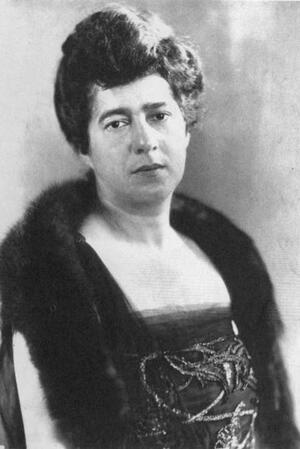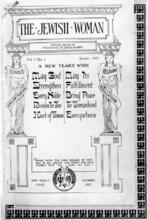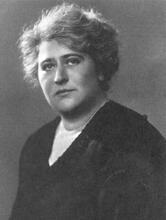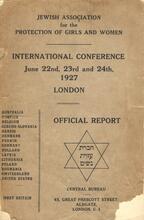Rose Brenner
President of the National Council of Jewish Women from 1920 to 1926, Rose Brenner (1884-1926) provided strong leadership, almost doubling the size of the organization. The NCJW has always championed both public service and the role of traditional motherhood; indeed, Brenner is the only unmarried woman ever to be president.
Institution: The Jacob Rader Marcus Center of the American Jewish Archives, Cincinnati, OH, www.americanjewisharchives.org and Bachrach.
As president of the National Council of Jewish Women, Rose Brenner focused on inclusion of people who were often marginalized—the deaf, the blind, and those isolated in rural areas. Brenner began chairing the local Brooklyn section of NCJW in 1908 and was made president in 1912, expanding membership, sponsoring a home for Jewish girls, and designating an annual “Council Sabbath.” Brenner served as national president of NCJW from 1920 to 1926, doubling membership, creating a National Speakers Bureau and a Committee on Deaf and Hard of Hearing, and publishing the first Jewish prayer book in Braille. She also created a Department of Farm and Rural Work separate from the regular Immigrant Aid department, helping Jewish families on 3,000 farms.
“The Council concerns itself with the Jewish woman, in America, and on her way to America: in the city and on the farm lands: in need of adjustment to her environment and capable of contributing to the enrichment of her environment.” This statement by Rose Brenner, first formulated in 1921 at a board of managers meeting, embodied her philosophy during her tenure as president of the National Council of Jewish Women (NCJW), from 1920 to 1926.
Early Life and Family
Rose Brenner, the eldest of four daughters and two sons, was born on April 3, 1884, in Brooklyn, New York, to Judge Jacob and Louise (Blumeneau) Brenner. Jacob Brenner was a leader in local political, religious, and philanthropic endeavors. The middle-class family belonged to Reform Beth Elohim Temple. When Rose was almost eighteen years old, her mother died. She immediately assumed the responsibilities of helping to care for her siblings, the youngest of whom was only eight months old. She also assisted her father in his many activities. Even with these additional duties, Rose Brenner entered Adelphi College and graduated with honors in 1908.
Early Work with National Council of Jewish Women
Soon after obtaining her college degree, Brenner accepted a chairmanship in the Brooklyn Section of the NCJW. She served as president of the section from 1912 to 1918. Under her administration, membership increased fivefold. New projects included religious study groups, sponsorship of a home for Jewish girls, and support of the war effort. Within the Brooklyn Section, Brenner organized a group of juniors. This led to the formation of the National Council of Jewish Juniors, which had its own constitution, officers, and biennial conventions. As president of the Brooklyn Section, Brenner designated the Sabbath nearest Purim as “Council Sabbath.” This observance, adopted nationally in 1920, provided synagogues with the opportunity to recognize NCJW members, and women with the chance to participate in worship services in their own congregations.
Brenner was elected second vice president at the NCJW 1914 Triennial Convention, first vice president at the 1917 Triennial Convention, and national president at the 1920 Triennial Convention. She was reelected president at the 1923 Triennial Convention.
During her presidency, NCJW expanded numerically from 150 sections with 28,000 members to 235 sections with over 50,000 members. This growth was the result of increased publicity about the NCJW’s work, attention to its resourceful and effective programs, and the continuation of volunteer efforts begun by women during World War I. Other secular women’s groups showed corresponding growth during this period. The membership rise enabled the NCJW to develop a National Speakers Bureau, a Committee on Deaf and Hard of Hearing, and an enlarged Department of Immigrant Aid. It prepared and distributed courses on Jewish prayer and published the first Jewish prayer book in Braille.
Legacy and Work with Broad Communities
Rose Brenner had shown keen interest in the Jewish immigrants who settled in America’s rural communities. Through Brenner’s initiative, delegates to the 1920 Triennial Convention created a Department of Farm and Rural Work that was separate from the immigrant aid work the NCJW had begun in the early part of the century to aid Jewish women and girls upon their arrival in America. This department became the second-largest NCJW program during the 1920s, reaching Jewish women and their families on nearly three thousand farms in eight states. It provided nurses to run preventive health care programs and, along with food and ritual objects, lecturers to stimulate observances of Jewish holidays. More than seven hundred Jewish children in rural areas participated in religious school classes, staffed by Hebrew teachers engaged by the NCJW.
Under Brenner’s administration, the national board strengthened and energized the growing organization in several other ways. It began publication in 1921 of the quarterly The Jewish Woman and of the monthly The Immigrant. State and regional conferences were started in order to dispense information to those who could not attend national conventions, to aid geographically close sections in working together, and to provide a ladder of leadership for more members.
Rose Brenner appointed committees on foreign relations and on reconstruction to assist in post-World War I resettlement. As part of the reconstruction program, the NCJW helped to establish NCJW sections in Europe. They cooperated with the American organization in caring for thousands of refugees abroad and on their way to America. This groundwork led to the first World Congress of Jewish Women held in Vienna in 1923, and the election of NCJW leader Rebekah Kohut as president.
Rose Brenner was actively involved in other causes related to and outside of the NCJW. She taught religious school at Beth Elohim Temple for twenty years, served as president of its sisterhood, and was the first woman elected to the temple’s executive board. Brenner was elected to the Brooklyn Board of Education and served as a director of the Women’s Foundation for Health. As president of the NCJW, she represented the organization at the biennial meetings of the National Federation of Temple Sisterhoods (NFTS) in 1921 and 1923. At her urging, the Conference Committee of National Jewish Women’s Organizations was formed at the 1925 biennial meeting of the NFTS.
Under Brenner’s stewardship, the NCJW initiated and broadened efforts to Americanize immigrants while encouraging their continued religious and ethnic identity. Its work on resettlement, citizenship, and peace efforts brought national and international recognition to the organization. Rose Brenner’s leadership is also significant, since she was the sole unmarried woman to attain the presidency of the NCJW, an organization that had championed traditional Jewish motherhood alongside its commitment to public service.
Rose Brenner died suddenly at home on April 5, 1926, at age forty-two.
AJYB 24:125, 29:117.
Brenner, Rose. Papers. National Office, National Council of Jewish Women Collection, Manuscript Division, Library of Congress, Washington, D.C. Box I: 2-4, 35–36, 103.
Campell, Monroe, and Willem Wirtz. The First Fifty Years, A History of the National Council of Jewish Women, 1893–1943 (1943).
The Immigrant (1921–1927).
The Jewish Woman (1921–1927).
Korelitz, Seth. “‘A Magnificent Piece of Work’: The Americanization Work of the National Council of Jewish Women.” AJH 83, no. 2 (June 1995): 177–203.
“Leader of American Jewish Womanhood Passes Suddenly.” The American Hebrew (April 9, 1926): 721.
National Council of Jewish Women. Official Report of the ... Triennial Convention ... 1917, 1920, 1923, 1926, and Report of the Office of the Executive Secretary for the Eleventh Triennial, 1923–1926 (1926), and Tenth Triennial Program and a Record of Council Achievements (1920–1923) (n.d.).
Rogow, Faith. Gone to Another Meeting: The National Council of Jewish Women, 1893–1993 (1993).
UJE 2:519–520.






